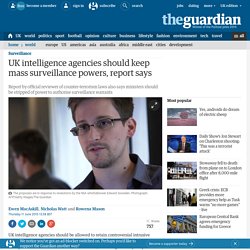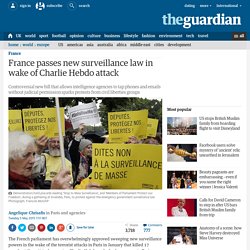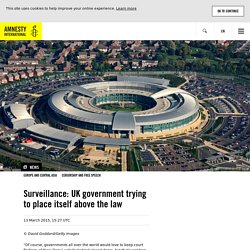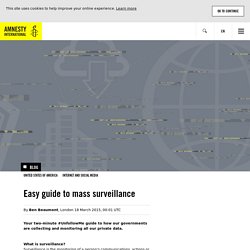

UK intelligence agencies should keep mass surveillance powers, report says. UK intelligence agencies should be allowed to retain controversial intrusive powers to gather bulk communications data but ministers should be stripped of their powers to authorise surveillance warrants, according to a major report on British data law.

The 373-page report published on Thursday – A Question of Trust, by David Anderson QC – calls for government to adopt “a clean-slate” approach in legislating later this year on surveillance and interception by GCHQ and other intelligence agencies. However, Downing Street hinted that David Cameron was unlikely to accept one of his key recommendations: shifting the power to agree to warrants from home and foreign secretaries to a proposed new judicial commissioner. The prime minister’s spokeswoman said the authorities needed to be able “to respond quickly and effectively to threats of national security or serious crime”, which appears to suggest ministers are better positioned to do this than judges. “But trust requires verification.
France passes new surveillance law in wake of Charlie Hebdo attack. The French parliament has overwhelmingly approved sweeping new surveillance powers in the wake of the terrorist attacks in Paris in January that killed 17 people at the satirical magazine Charlie Hebdo and a kosher grocery in Paris.

The new bill, which allows intelligence agencies to tap phones and emails without seeking permission from a judge, sparked protests from rights groups who claimed it would legalise highly intrusive surveillance methods without guarantees for individual freedom and privacy. Protesters for civil liberties groups launched a last-ditch campaign against the bill under the banner “24 hours before 1984” in reference to George Orwell’s dystopian novel about life under an all-knowing dictatorship. Groups including Amnesty International warned of “extremely large and intrusive powers” without judicial controls. Surveillance: UK government trying to place itself above the law. © David Goddard/Getty Images “Of course, governments all over the world would love to keep court findings of their illegal activity behind closed doors, but that’s not how open justice works.” – Rachel Logan The UK government is arguing the law should be ignored after having been caught out breaking it, Amnesty International UK said today, following the latest development in a historic court case that has uncovered serious illegality in the UK surveillance programme.

Lawyers for the government appeared at the Investigatory Powers Tribunal today to argue that despite having accepted that their regime for the interception of legally-privileged material was unlawful, the court should not let those who have had their confidential communications illegally handled know that they have been victims of human rights violations, in what Amnesty says is a clear breach of the law which obliges the Tribunal to do so. Document. Easy guide to mass surveillance. Your two-minute #UnfollowMe guide to how our governments are collecting and monitoring all our private data.

What is surveillance? Surveillance is the monitoring of a person’s communications, actions or movements. When is surveillance legal? Broadly, when it is necessary, targeted, based on sufficient evidence of wrongdoing, and authorised by a strictly independent authority, such as a judge. What is mass surveillance? Can mass surveillance ever be legal? Who are the ‘five eyes’? What is GCHQ? What is the NSA?
Are governments spying on me? El nuevo mundo después de Snowden. En la era post-Snowden, las sociedades democráticas se enfrentan a dos opciones.

La más fácil es que las cosas continúen como de costumbre, pretendiendo que el insaciable deseo de datos por parte de la NSA es tan solo una aberración que puede rectificarse mediante algunos apaños en varios aspectos del aparato técnico-legal existente. De este modo, podremos reajustar los protocolos de datos irregulares, introducir más códigos cifrados en las redes y aprobar nuevas leyes que supervisen a la NSA.
Pero también podríamos decidirnos por una opción más exigente que la de permitir que las revelaciones de Snowden representen poco más que la simple y sistemática extralimitación administrativa de unos pocos burócratas fuera de control. Siguiendo esa opción, esas revelaciones nos advierten de una emergente —y escasamente reconocida— amenaza para el ethos democrático, que sólo podrá empeorar a medida que los medios para recopilar, registrar y analizar más datos se hagan más omnipresentes.